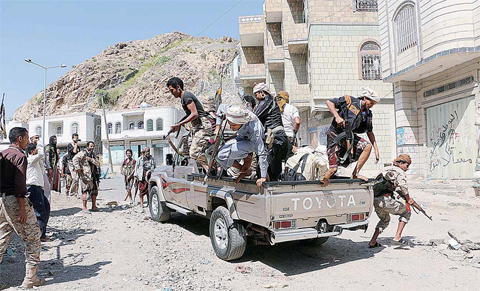 TAEZ: Tribal fighters prepare to take their positions on a street during fighting with Shiite rebels known as Houthis in Taez, Yemen. —AP
TAEZ: Tribal fighters prepare to take their positions on a street during fighting with Shiite rebels known as Houthis in Taez, Yemen. —APDUBAI: Human Rights Watch (HRW) has urged the US Congress to block the sale of aerial bombs to Saudi Arabia, warning their likely use in Yemen risked more civilian deaths. The kingdom has led a bombing campaign in its southern neighbor since March, carrying out hundreds of strikes against Iran-backed rebels who had overran much of the country. Despite widespread criticism of the high civilian death toll, Washington this week approved a $1.29 billion deal for more than 19,000 smart bombs to replenish the Saudi air force's arsenal. Congress has 30 days to block the sale. "The US government is well aware of the Saudi-led coalition's indiscriminate air attacks that have killed hundreds of civilians in Yemen since March," Human Rights Watch said on Wednesday.
"Providing the Saudis with more bombs under these circumstances is a recipe for greater civilian deaths, for which the US will be partially responsible," HRW's deputy director for the Middle East and North Africa, Joe Stork, said. "The US Congress has played a role in opposing sales of US weapons used in violation of the laws of war and should do so in this case." HRW said last month that it had documented more than two dozen air strikes by the Saudi-led coalition that appeared to be in violation of the laws of war. The United Nations says more than 5,700 people have been killed in the conflict in Yemen since the Saudi-led military intervention began. Nearly half of them have been civilians.
Iran slams Saudi
Meanwhile, Iran has called for all sides in Yemen's war to join UN-sponsored peace talks and accused Saudi Arabia of worsening the conflict with its military intervention against Tehran-backed rebels. In talks with visiting UN envoy Ismail Ould Cheikh Ahmed on Wednesday, Iranian officials including Foreign Minister Mohammad Javad Zarif backed his efforts to resolve the conflict.
Stressing the UN role "in finding a political solution in Yemen," Zarif called for "the participation of all Yemeni groups" in talks Cheikh Ahmed is hoping to convene in Geneva this month, the IRNA news agency reported. UN efforts have repeatedly failed to resolve the conflict in Yemen, where the pro-Iran Shiite Houthi rebels have seized control of large parts of the country, including the capital Sanaa. A Saudi-led coalition launched air strikes against the rebels in March and has sent ground troops in support of a fightback by forces loyal to President Abedrabbo Mansour Hadi.
In separate talks with Cheikh Ahmed, Iran's deputy foreign minister told the envoy Saudi Arabia's intervention was making security worse. "For the Islamic Republic of Iran, the security of Yemen, Saudi Arabia and the region are important," the ISNA news agency quoted Hossein Amir Abdollahian as saying. "But Saudi Arabia cannot endanger the security of others to provide its own security," he said. Cheikh Ahmed for his part praised Iran as "an important and influential country in the region" which has "a determining role in the fight against terrorism," IRNA reported. The humanitarian crisis in Yemen has been identified by the United Nations as one of the world's worst, with 80 percent of the country's population on the brink of famine.- Agencies









